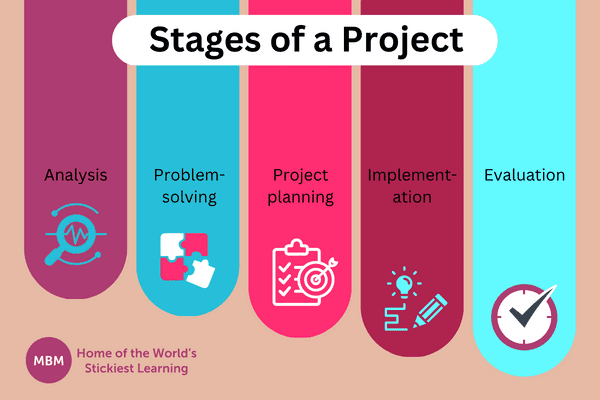Understand What Works, and Achieve the Results You Want
Managing team projects is about developing skills and applying them. There are some proven ways to manage team projects effectively, and achieve the ‘co-creation’ Stephen R. Covey refers to as Habit #6 in his book The 7 Habits of Highly Effective People. The first step to understanding these ways and applying them is to grasp what the terms mean.
What Is ‘Managing a Team’ In Project Management?
Wikipedia’s definition is: “Team management is the ability of an individual or an organisation to administer and coordinate a group of individuals to perform a task.”
The HR management website mymanagementteam.com expands on this. It says the process of managing team projects involves:
- Tracking team members’ performance.
- Using feedback.
- Resolving strategic and operational issues
- Managing changes for the purpose of optimising project performance.

This brings us to the next question…
What is a Project?
Managing team projects involves bringing teams together and leading them in a specific task, for a finite period. Projects are different from companies’ core businesses, which are ongoing. If a task has a definite end point, it classifies as a project.
What Are Some Examples of Project Teams?
- Business improvements and relocation
- Company restructuring
- Digitisation of a business
- Engineering projects
- Company flotations
- Marketing campaigns
- Mergers and acquisitions
- NPD and product launches
- Sustainability programmes
- Test markets
What Makes Good Team Project Management?
Effective project teams know what their goals are, and understand them well. A major part of this comes from top management. If top management and you as the project manager define the goals accurately, it’ll be much easier for your team to internalise them. Similarly, effective teams have a say in creating goals together as well.
What Makes Teams Really Effective?
In 2015, Google let researchers pick their brains to uncover what makes teams effective. The findings apply to project teams as much as to ‘permanent’ work teams, so they’re worth noting. The study found there were 5 key dynamics dictating team effectiveness:
Psychological Safety:
Team members felt comfortable taking risks, and didn’t fear judgment from other team members.
Dependability:
People could count on one another to take responsibility and complete their work on time.
Structure and Clarity:
Team members understood the goals, plans, and strategies.
Meaning of Work:
Individuals saw their part of the project as personally significant.
Impact of Work:
Team members perceived their work to be valuable in the grand scheme of things.
It’s important as the project manager to be aware of these dynamics and remember them when leading your team.
Team Projects Generally Don’t Involve the Company’s Core Business. But Sometimes They Do.

A common factor in team projects is that they tackle a task of finite duration. Unforeseen circumstances can arise, like in the pandemic, where businesses need to work out quickly how the company can continue. It makes sense to address these situations by forming a project team, drawing people from across the business. Once the necessary decisions are taken and the situation is resolved, people can return to their normal work.
In “normal” circumstances, team projects don’t necessarily involve the company’s core business, though they may be concerned with finding ways to improve it. In R&D, it’s not a complete disaster if projects don’t succeed, because they generate learnings that will ultimately lead to success.
Many great business leaders, particularly in ‘tech’ companies, have won through by persisting with development projects, even if they haven’t worked out for whatever reason. In these situations, there are no negative consequences for failure, unlike if a normal work team fails to perform.
What are the Stages of a Project?
- Analysis: Identifying the problem and understanding the issues to be addressed.
- Problem-solving: Identifying the best possible solution.
- Project planning: Designing and resourcing the solution.
- Implementation: Achieving the change and innovation that is required.
- Evaluation: Tracking the project’s progress and evaluating its effectiveness, and modifying the project programme as required.

What are the 4 Main Roles of a Project Team?
- The project sponsor: They ‘own’ the project, and are responsible for championing and resourcing it.
- The project manager: They answer to the project sponsor and are responsible for leading and overseeing the project.
- The project team: These are the people who do the work and make the project happen, and can be taken for granted. Their responsibilities typically include contributing to the overall project objectives, completing individual deliverables, providing expertise, and crucially, documenting the process.
- The business analyst: This is another important role in team projects. Let’s look at it in detail.
I Need to Talk to My Analyst!

The business analyst’s role involves analysis and problem-solving:
- Understanding the opportunities or threats presented by the external environment – the problem – and the business’s available resources to address them.
- Getting insight into the business’s existing operations, to identify the causes and effects behind previous failures or poor results, which have led to the project becoming necessary.
- Identifying the change and innovation needed to reconcile the problem – the scope of the project.
- Predicting the likely results of implementing the project, and finding ways to ensure they meet expectations.
The business analyst is crucial in having this informed oversight of the project, addressing people’s expectations and the concerns of the stakeholders involved, i.e. everyone who depends on the project to succeed.
Do We Need a Single Business Analyst or a Team?
It all depends on what’s involved in the project. In a major business project, rather than leaving it to a single individual, the analysis and problem-solving are usually best managed by a group answering to an appointed leader, with outside support where appropriate.
Like the project team members who do the actual work, this group can involve people across the business, from the CEO or a designated person from the business’s leadership to operations managers and specialists from such areas as finance, IT, sales, marketing, production, logistics and HR.
Why are Analysis and Problem-solving So Important?
Projects are at risk of failing if this kind of analysis isn’t carried out fully and properly at the start. It’s essential to make sure the project is going to succeed, or at least has a good chance. In the analysis and problem-solving stage, incisive analysis needs to go hand in hand with effective project management, to get this part of the work done on schedule.
Thinking Clearly: How to Lead a Project Team Effectively and Efficiently

Kissflow, the project management app vendor, talks of 10 ‘dynamic strategies’ to use in managing team projects:
- Ensure balance within the team.
- Focus on visibility and transparency.
- Ensure effective communication.
- Foster a culture of collaboration.
- Value each suggestion, and discuss progress with your team.
- Establish success metrics and reward excellence.
- Delegate tasks to groom future leaders.
- Manage internal conflicts.
- Use all available resources at your disposal to facilitate teamwork.
- Take part in regular team-building activities and celebrations.
Business projects are a serious matter, there’s no denying it. But people do better work when they’re happy.
Tools and Techniques for Managing Team Projects

In major projects, you’re likely to have several sub-projects happening simultaneously. Without good systems in place, it’s hard to know what work to prioritise, and how to help your team manage their workload effectively and track that things are being done on time.
As the project manager, you need not be an expert on project management systems to benefit from using them. Work management software vendor Asana suggests 10 strategies:
1. Designate One Place to House All Your Projects:
Ensure visibility across your projects by planning and managing them in the same place, with a work management platform.
2. Define Terms and Gather Feedback:
Define goals, plans, responsibilities, and expectations at the outset, and allow time for feedback and approvals.
3. Task Prioritisation:
Prioritise the tasks likely to have the most impact.
4. Empower Your Team to Be Flexible When Priorities Change:
Set team priorities and focus on work, but be flexible enough to pivot when needed. Tracking work in one place means everyone’s work is visible, and you can get a quick sense of your team’s bandwidth and current tasks. If you need to reprioritise, you won’t worry that tasks will be lost or neglected.
5. Manage and Communicate Expectations Clearly:
If you have insight into the work people are doing, you understand how timelines and priorities are shifting, and how the project is progressing. Good communication means everyone’s up to date. Work management tools help, but there’s nothing like the human touch. Learn more about this with our ultimate guide on communication skills.
6. Look at the Work Across Different Parts of the Project, to Balance Workloads and Timelines:
Make sure you can see team members’ workloads, see how busy they are, and reassign people as needed.
7. Adjust Project Schedules to Maximise Team Productivity:
Plan projects with the full scope of your team’s work in mind. Stagger start dates for similar sub-projects, especially if you have the same people working on multiple projects. Look out for ‘dependencies’ i.e. what steps will depend on previous steps being completed.
8. Flag Duplicate Tasks:
If the same activity happens in several projects, make sure it gets done in good time. The timing makes all the difference in keeping multiple projects on track.
9. Delegate, but Stay Visible:
You don’t want to micromanage, but neither do you want to be absent! Make sure you can check in on progress when necessary. Losing sight of tasks and feeling in the dark about what’s being done makes it difficult to be an effective leader. Again, keep all the work in a centrally shared place so you can see what’s on everyone’s plate, know when tasks are due, and how they’re progressing.
10. Adjust How You Start Your Project:
Standardise and simplify how you start projects, so you get up to speed faster and more efficiently each time. As you discover new best practices and insights, make sure everyone knows about them and uses them.
So, You Want to Be a Project Management Star?

Here are some soft skills to make you better at managing team projects. Yes, the first skill involves using tech. But the others are about human interaction:
Skill #1: Organisation
This can be the hardest soft skill of all to work on. The best way to become a better organiser is to create a central place for your team’s work. Use the tools available.
Make the System Work for You, Not the Other Way Round!
It’s important not to let the thought of these project management systems overwhelm you. Get people you trust to handle the nuts and bolts of setting up systems to track the project, freeing you to inspire and lead the team doing the work.
Skill #2: Collaboration
Going back to Stephen R. Covey’s idea of co-creation being Habit #6 of Highly Effective People, collaboration helps you get work done quickly and more efficiently. With more minds involved, projects become more creative and well-developed. To improve your collaboration skills, work on your active listening so you stay engaged and focused when others are speaking. Practise open communication, and reduce boundaries as much as possible.
Skill #3: Teamwork
Everyone on the team has something to bring to the table, and they’re more effective at working together than alone. Teamwork ensures they all feel welcome, valued, and supported to contribute. Dig deeper into brainstorms, have one-to-one conversations with team members, and ask for feedback. Encourage ‘quiet people’ to come forward, and welcome team members’ ideas.
Skill #4: Communication
Communicating well makes projects run smoothly and more enjoyable. Be open and honest, and develop trust with your team members. Encourage them to bring their thoughts to the table – even if you disagree!
Skill #5: Time Management
As you get better at organising tasks, you’ll develop a clearer sense of what’s on your plate and how long things will take.
Skill #6: Leadership
As a project manager, your team looks to you for leadership, guidance, and support. Practise approaching situations with empathy and understanding. Good leaders bring everyone together and make them feel supported.
Skill #7: Problem-solving
This isn’t about always having the ‘right’ answer, it’s about approaching problems from new perspectives and methodically working towards a solution. Businesses like wholesaling, retailing and grocery increasingly rely on data-driven frameworks and analyses. But humans still make the final decisions.
Skill #8: Critical Thinking
Work on approaching problems logically, instead of making decisions based on your emotions. Critical thinking helps make sure you’re approaching the situation from the right perspective.
Skill #9: Conflict Resolution
Work on addressing both sides, so everyone feels heard and supported. Take the time to listen and try to find a solution that works for everyone.
Skill #10: Adaptability
Great project managers know how to pivot and adapt and steer their project team in the right direction. Developing soft skills like self-awareness and mindfulness can help you be more in touch with your emotions and manage them during times of change.
Remember, You’re Working With Human Beings, Who Have Feelings Too
You know you’re managing team projects effectively, when:
- Project teams understand their mission.
- Individual team members know what they need to do.
- Teams are excellent communicators.
- There’s a positive team culture.
Finally, Here’s a Handy Acronym to Remember
When all’s said and done, managing team projects isn’t just about being in charge, it’s about being human. Remember ‘B.E.C.C.’:

Managing team projects isn’t easy. But whatever the project involves, if you approach your role with patience and empathy, you’ll bring your people with you and achieve a better result.
Action: For even more useful content on team building, check out our ultimate guide on Team Building Skills.




